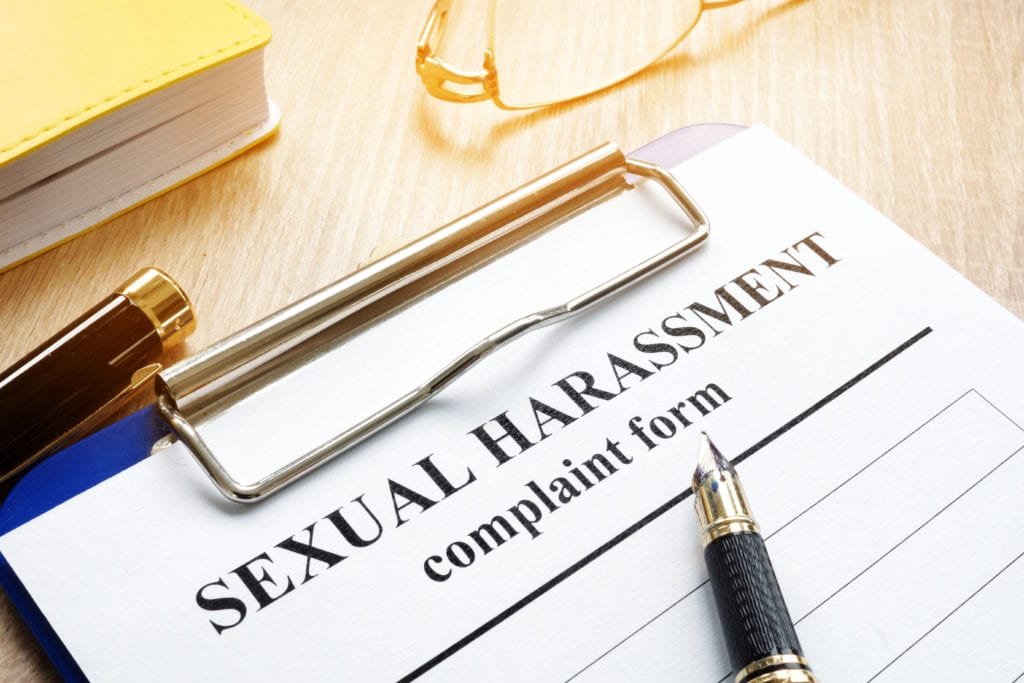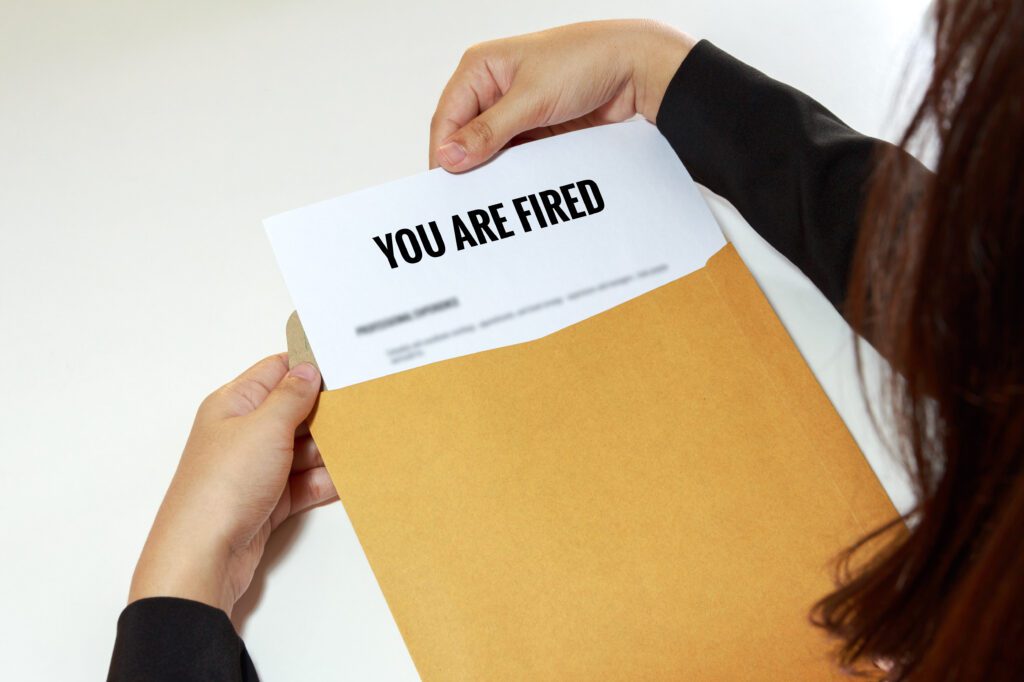Brian J Graber LLC is an Illinois sexual harassment lawyer representing Illinois employees sexually harassed in violation of Illinois and federal sexual harassment laws. The Illinois Human Rights Act, (IHRA), provides Illinois employees with strong rights to be free from workplace sexual harassment. Illinois employees also have federal rights to be free from sexual harassment. Learn more about your federal rights to be free from sexual harassment here.
Under the IHRA, 775 ILCS 5/2-101(B)(1)(b), Illinois sexual harassment law applies to any Illinois employer employing one or more employees when a complainant alleges a civil rights violation based on sexual harassment. Effective on July 1, 2020, Illinois amended the IHRA, 775 ILCS 5/2-101(B)(1)(a) so that its civil rights protections apply to any person employing one or more employees within Illinois during 20 or more calendar weeks within the calendar year of or preceding the alleged violation. This is significant because federal sexual harassment law under Title VII of the Civil Rights Act of 1964 only applies to employers employing 15 or more employees.
The IHRA defines “sexual harassment” as follows:
“Sexual harassment” means any unwelcome sexual advances or requests for sexual favors or any conduct of a sexual nature when (1) submission to such conduct is made either explicitly or implicitly a term or condition of an individual’s employment, (2) submission to or rejection of such conduct by an individual is used as the basis for employment decisions affecting such individual, or (3) such conduct has the purpose or effect of substantially interfering with an individual’s work performance or creating an intimidating, hostile or offensive working environment. For the purposes of this definition, the phrase “working environment” is not limited to a physical location where an employee is assigned to perform his or her duties.
775 ILCS 5/2-101(E).
The Federal Arbitration Act was amended effective March 3, 2022, to ban mandatory arbitration agreements covering workplace sexual harassment and sexual assault claims. Click here to learn more about your rights to be free from mandatory arbitration agreements filed under Illinois and federal law.
Illinois Sexual Harassment Law Imposes Strict Liability on Employers for Sexual Harassment Committed by Its Managers and Supervisors
The Illinois Human Rights Act makes it a civil rights violation:
For any employer, employee, agent of any employer, employment agency or labor organization to engage in sexual harassment; provided, that an employer shall not be responsible for sexual harassment of the employer’s employees by non-employees or non-managerial and supervisory employees only if the employer becomes aware of the conduct and fails to take reasonable corrective measures.
775 ILCS 5/2-102(D)

The Illinois Supreme Court interprets 775 ILCS 5/2-102(D) as imposing strict liability on the employer for any sexual harassment caused by its supervisory employees, even when the supervisor has no authority to affect the terms and conditions of the victim’s employment. See Sangamon Co. Sheriff’s Dept. v. IHRC, 233 Ill.2d 125, 137 (2009). The Illinois Supreme Court refused to adopt any affirmative defense to strict liability similar to the affirmative defenses allowed under Title VII when the sexually harassed employee suffers no tangible employment action. See Sangamon Co. Sheriff’s Dept., 233 Ill.2d at 138-139.
Illinois Sexual Harassment Law Imposes Liability on Employers for Sexual Harassment Committed by Co-workers and Non-employees Under a Negligence Standard
The IHRA imposes liability on employers under a negligence standard for sexual harassment committed by co-workers (non-managerial and supervisory) and non-employees as follows:
. . . an employer shall be responsible for sexual harassment of the employer’s employees by non-employees or non-managerial and non-supervisory employees only if the employer becomes aware of the conduct and fails to take reasonable corrective measures.
775 ILCS 5/2-102(D)
Illinois sexual harassment law imposes liability on an employer under a negligence standard identical to federal sexual harassment law where the employer has actual or constructive knowledge of the sexually harassing conduct committed by non-employees and/or its non-managerial and non-supervisory employees and fails to take any corrective action to stop or prevent further sexual harassment.

Most employers in Illinois have a written sexual harassment reporting policy. These written sexual harassment reporting policies identify the persons whom an employee is required to report occurrences of sexual harassment. Following your employer’s written sexual harassment reporting policy and immediately reporting clearly the details of any occurrences of sexual harassment assures that your employer will have notice of the sexual harassment under 775 ILCS 5/2-102(D) so as to impose liability on the employer for its negligence in failing to prevent further sexual harassment. Failure to report sexual harassment of non-employees or co-workers under your employer’s sexual harassment reporting policy may allow your employer to escape liability for sexual harassment by claiming a lack of knowledge of the sexual harassment and, therefore, its failure to take action to prevent further sexual harassment was not negligent.
An employer that retaliates against an employee for reporting sexual harassment of non-employees or co-workers opens itself up to liability under the IHRA, 775 ILCS 5/6-101(A) for a retaliation claim. The IHRA provides as follows:
It is a civil rights violation for a person, or for two or more persons to conspire, to: (A) Retaliation. Retaliate against a person because he or she has opposed that which he or she reasonably and in good faith believes to be unlawful discrimination, sexual harassment in employment . . .because he or she has made a charge, filed a complaint, testified, assisted, or participated in an investigation, proceeding, or hearing under this Act . . . .
775 ILCS 5/6-101
Illinois Sexual Harassment Law Imposes Liability on Employers for Same-Sex Sexual Harassment
Under Illinois sexual harassment law, same-sex sexual harassment violates 775 ILCS 5/2-102(D) and imposes liability on employers as described above for male-on-male and female-on-female sexual harassment. If you would like to learn more about your rights under Illinois and federal law to be free from same-sex sexual harassment, contact Brian J. Graber, Ltd., an Illinois sexual harassment lawyer at (312) 291-4648, or email us for a free consultation.
Illinois Sexual Harassment Law Imposes Liability on Employers for Sexual Harassment of Non-Employees
Effective on January 1, 2020, Illinois sexual harassment law imposes liability on employers for sexual harassment of non-employees as follows:
Sexual harassment of non-employees. For any employer, employee, agent of any employer, employment agency, or labor organization to engage in sexual harassment of non-employees in the workplace. An employer is responsible for sexual harassment of non-employees by the employer’s non-managerial and non-supervisory employees only if the employer becomes aware of the conduct and fails to take reasonable corrective measures. For the purposes of subdivision (D-5), “non-employee” means a person who is not otherwise an employee of the employer and is directly performing services for the employer pursuant to a contract with that employer. “Non-employee” includes contractors and consultants.
775 ILCS 5/2-102(D-5)
IHRA, 775 ILCS 5/2-102(D-5) tracks the language 775 ILCS 5/2-102(D) that imposes strict liability on employers for committed by its managerial and supervisory employees. Therefore, based on the Illinois Supreme Court’s decision in Sangamon Co. Sheriff’s Dept. v. IHRC, 233 Ill.2d 125, 137 (2009) 775 ILCS 5/2-102(D-5) will likely be interpreted to impose strict liability on employers for sexual harassment of non-employees committed by its managerial and supervisory employees.
The IHRA, 775 ILCS 5/2-102 (D-5) appears to impose liability on an employer for sexual harassment committed against non-employees by its non-managerial and non-supervisory employees and other non-employees under a negligence standard. This means any non-employee should immediately and clearly report any sexual harassment committed by an employer’s non-managerial employees or other non-employees so as to impose liability on the employer if it negligently fails to take proper corrective action to stop and prevent further sexual harassment as described above.
The plain language of the IHRA, 775 ILCS 5/6-101 imposes liability on any “person,” including an employer who would retaliate against a non-employee who reports sexual harassment.
Statute of Limitations
Effective January 1, 2025, the IHRA, 775 ILCS 5/7A-102(A)(1) requires an employee to timely file a written Charge of Discrimination under oath with the Illinois Department of Human Rights within 2 years after the date that a civil rights violation allegedly has been committed. Click here to learn more about the amendment extending the deadline to file a Charge of Discrimination with the IDHR. Illinois employees may also have federal rights to be free from workplace sexual harassment under Title VII which carries a 300-day statute of limitations. The statutes of limitations under Illinois and federal sexual harassment law are complicated and you should consult a competent Illinois sexual harassment lawyer as soon as possible to protect your Illinois and federal rights to be free from workplace sexual harassment.
If you believe that you have been subjected to unlawful sexual harassment in violation of your rights under Illinois and federal sexual harassment law, contact Brian J Graber LLC, an Illinois sexual harassment lawyer for a free confidential consultation at (312) 291-4648 or by email. Brian J Graber LLC, an Illinois sexual harassment lawyer prepares Charges of Discrimination and dual files those Charges with The Illinois Department of Human Rights and the EEOC for its clients.
Illinois Gender Violence Act claims against employers.
Effective on January 1, 2024, Illinois amended the Illinois Gender Violence Act, 740 ILCS 82/1, et seq., to expressly allow lawsuits against employers in certain circumstances involving “gender-related violence” in the workplace.
The Illinois Gender Violence Act defines “gender-related violence,” which is a form of sex discrimination as follows:
(1) One or more acts of violence or physical agreession satisfying the elements of battery under the laws of Illinois that are committed, at least in part, on the basis of a person’s sex, whether or not those acts have have resulted in criminal charges, prosecution, or conviction. (2) A physical intrustion or physical invation of a sexual nature under coercive conditions satisfying the elements of battery under the laws of Illinois, whether or not the act or acts resulted in criminal charges, prosecution, or conviction. (2.5) Domestic violence, as defined by the Victims’ Ecomonmic Security and Safety Act. (3) a threat of an act described in item (1), (2), or (2.5) causing a realistic apprehension that the originator of the threat will commit the act.
Illinois Gender Violence Act, 740 ILCS 82/5.
Under Illinois law, 720 ILCS 5/12-3(a) a person commits battery if he or she knowingly without legal justification by any means (1) causes bodily harm to an individual or (2) makes physical contact of an insulting or provoking nature with an individual.
The Gender Violence Act defines “workplace” broadly as follows:
“Workplace” means the employer’s premises, including any building, real property, and parking area under the control of the employer, or any location used by an employee while in the perfromance of the employee’s job duties. Workplace includes activities occurring off premises at employer-sponsered events where an employee is perfroming the employer’s job duties.
Illinois Gender Violance Act, 740 ILCS 82/5.
The Gender Violence Act, 740 ILCS 82/10 creates a statutory cause of action for anyone who has been subjected to “gender-related violence” as defined above. Liability for “gender-related violence” occurring in the workplace is imposed on employers in certain circumstances.
Under the Gender Violence Act, 740 ILCS 82/11(a) an employer is only liable for gender-related violence in the workplace by an employee or agent of the employer when the interaction giving rise to the gender-related violence extends to gender-related violence that occurs:
- While the employee was directly performing the employer’s job duties and the gender-related violence was the proximate cause of the injury; or
- While the agent of the employer was directly involved in the gender-related violence and the performance of the contracted work was the proximate cause of the injury.
Under 740 ILCS 82/11(a), proximate cause exists when the actions of the employee or agent of the employers were a substantial factor in causing the injury.
The Gender Violence Act, 740 ILCS 82/11(a) states, “An employer is liable if the employer has acted in a manner inconsistent with how a reasonable person would act under similar circumstances.”
However, the Gender Violence Act, 740 ILCS 82/11(b) only imposes liability on an employer for gender-related violence if the employer:
- Failed to supervise, train, or monitor the employee who engaged in the gender-related violence. An employer providing training pursuant to Section 2-109 of the Illinois Human Rights Act shall have an affirmative defense that adequate training was provided to the employee; or
- Failed to investigate complaints or reports directly provided to a supervisor, manager, owner, or another person designated by the employer of similar conduct by an employee or agent of the employer and the employer failed to take remedial measures in response to the complaint or reports.
The Gender Violence Act, 740 ILCS 82/11(b)(2) appears to impose liability on those employers that fail to investigate complaints of sexual harassment and/or gender-related violence and otherwise fail to take remedial measures to stop and prevent gender-related violence in the workplace. Under the Gender Violence Act, 740 ILCS 82/11 victims are free to pursue any other rights or causes of action created by statute or common law. Therefore, victims of gender-related violence are free to pursue claims for sexual harassment under the Illinois Human Rights Act, Title VII of the Civil Rights Act of 1964, and common law battery claims in addition to claims under the Illinois Gender Violence Act.
If you believe your employer violated your rights under the Illinois Gender Violence Act to be free from “gender-related violence” in the workplace, contact BRIAN J GRABER LLC an Illinois sexual harassment lawyer for a free confidential consultation at (312) 291-4648 or by email.
The statute of limitations for filing a claim against your employer for violating your rights under the Illinois Gender Violence Act, 740 ILCS 82/20 is four (4) years as follows:
An action against an employer pursuant to Section 11 must be commenced within 4 years after the cause of action accurred, axcept that if the person entitled to bring the acxtion was a minor at the time of the cause of action accurred, the action must be commenced within 4 years after the person reachesd the age of 18.
Illinois Gender Violence Act, 740 ILCS 82/20.

If you believe your rights were violated under Illinois and Federal sexual harassment laws and/or the Illinois Gender Violence Act, contact BRIAN J GRABER LLC an Illinois sexual harassment lawyer at (312) 291-4648 or by email to schedule a free confidential consultation.
